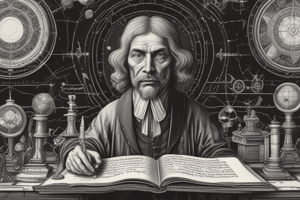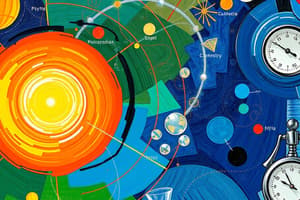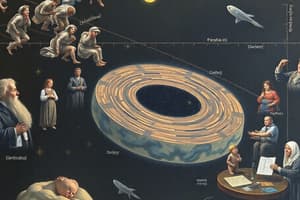Podcast
Questions and Answers
Who created the scientific method?
Who created the scientific method?
Francis Bacon
Who proposed the heliocentric theory?
Who proposed the heliocentric theory?
Nicolaus Copernicus
The first step in the scientific method is to ___
The first step in the scientific method is to ___
form a hypothesis
Which change occurred during the Renaissance?
Which change occurred during the Renaissance?
Scientists in ancient Greece believed that ___
Scientists in ancient Greece believed that ___
Which statement best describes the scientific method?
Which statement best describes the scientific method?
Which completely transformed scientific study?
Which completely transformed scientific study?
How did the telescope help make the Scientific Revolution possible?
How did the telescope help make the Scientific Revolution possible?
Which statement describes the Greek philosopher Socrates?
Which statement describes the Greek philosopher Socrates?
How did barometers advance science?
How did barometers advance science?
Flashcards are hidden until you start studying
Study Notes
Scientific Method and Key Figures
- Francis Bacon is credited with the creation of the scientific method, a systematic approach to inquiry.
- Nicolaus Copernicus proposed the heliocentric theory, which places the Sun at the center of the universe, challenging geocentric views.
Steps and Principles of the Scientific Method
- The first step in the scientific method is forming a hypothesis, which sets the foundation for experimentation.
- The scientific method represents a new, structured way to tackle problems and conduct research, moving away from traditional methods.
Influence of the Renaissance
- During the Renaissance, scholars revived an interest in classical ideas and philosophies, paving the way for advancements in science and thought.
Ancient Greek Contributions
- Ancient Greek scientists believed that logic and reason could explain all phenomena in the world, emphasizing rational thought.
- Socrates, a notable Greek philosopher, taught that reasoning is essential to uncovering truth and understanding.
Impact of Technological Advancements
- The invention of the telescope was pivotal for the Scientific Revolution, enabling scientists to make detailed observations of celestial objects.
- Barometers advanced scientific knowledge by allowing the measurement of atmospheric pressure, leading to better understanding of weather and physics.
Transformation of Scientific Study
- The Scientific Revolution marked a significant transformation in the way scientific study was approached, fostering a more empirical and observational stance in research.
Studying That Suits You
Use AI to generate personalized quizzes and flashcards to suit your learning preferences.




